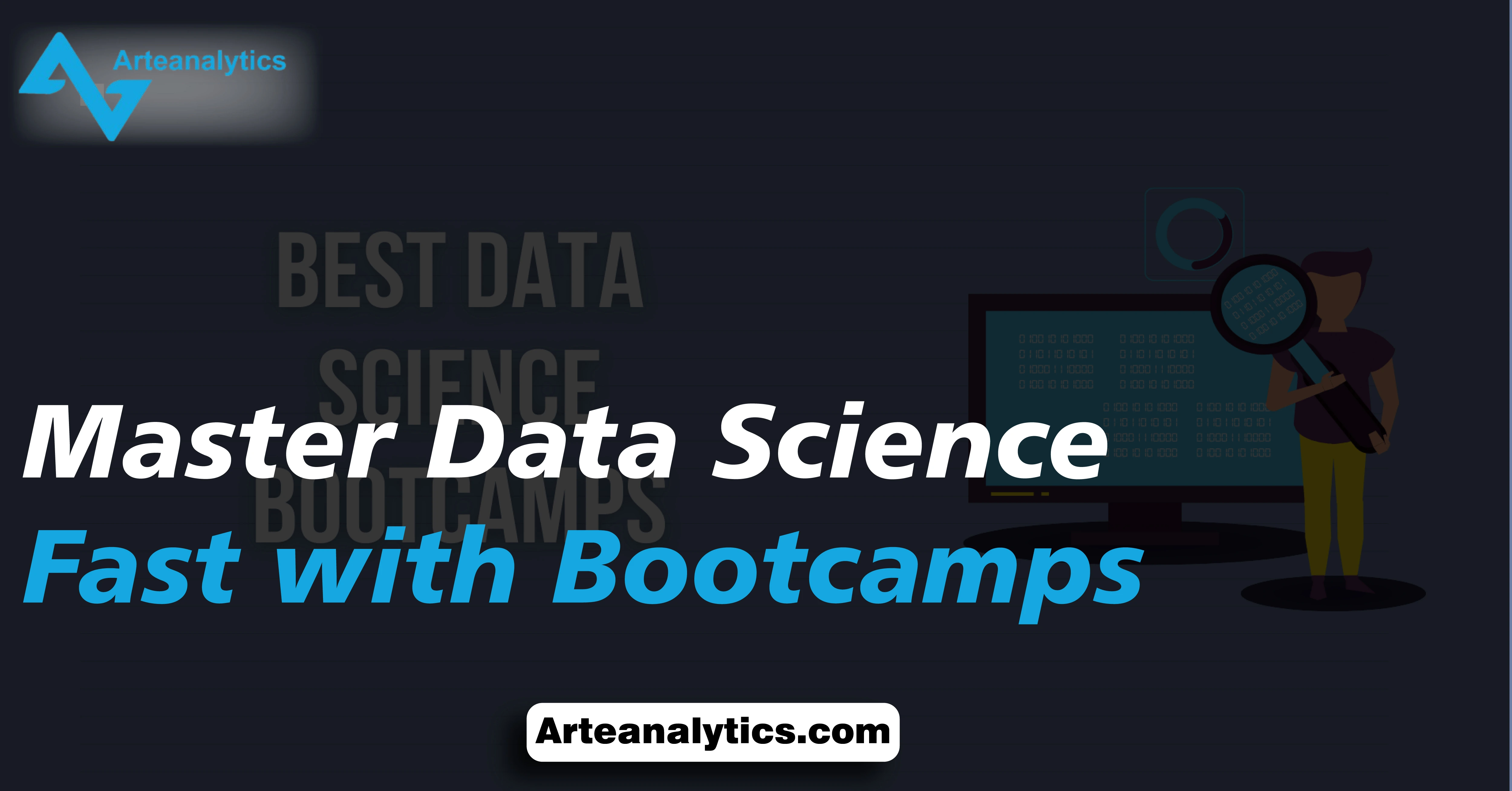Master Data Science Fast with Bootcamps
blog | Published on: 2025-01-23

Introduction
Data Science Bootcamps are intense educational programs for short durations which are intended to equip students with essential knowledge of information science in an extremely focused and active setting. They cover crucial topics, including the application of machine learning, data analytics, as well as programming languages like Python and R. The majority of the time the curriculum is based on workshops, classes and other seminars and hands-on applications. Bootcamps are a great programme specifically geared towards job seekers or anyone looking to build their abilities.
Certain boot camps offer the possibility of career development including assistance in the search for a job and opportunities to network. The duration of these programs differs as well as their learning format and is suitable for those who are starting their journey, or already have some knowledge. Its goal is to train students for jobs at entry level in the rapidly growing sector of data science with hands-on training.
What Are Data Science Bootcamps?
Bootcamps in data science are an awe-inspiring course designed to teach students the essential techniques needed to succeed in the realm of sciences that deal with information. The programs usually last between 8 and 24 weeks, and are focused on the actual aspect of data science rather than theoretical concepts. Students acquire fundamental skills like machine learning, data analysis and programming using software that include Python, SQL, and the data visualization software.
The most significant advantages of these boot camps is their focus on becoming employed. A lot of them work in conjunction with recruiters and provide aid in placement as well as opportunities to build relationships, which makes these programs a great choice for people who want to transition into tech or looking to expand their knowledge.
Why Are Data Science Bootcamps Gaining Popularity?
The boot camps for data science have gained popularity because of their effectiveness and efficiency. There are many reasons for their success.
- Accelerated learning program: This one reduces years, or months of learning into only several weeks. It saves time.
- Careers The main focus: Curricula are designed to be a replica of the jobs students may confront in their career which will help them be ready for work.
- accessibility candidates don't need advanced degrees or deep understanding of science and technology for their application.
- Possibility of Networking: Programs connect participants to industry mentors, instructors and alumni, who assist them with their professional development.
Why Consider a Data Science Bootcamp?
A lot of people find these programs for data science bootcamps are an excellent alternative to traditional degrees. Instead of taking years to finish an academic degree at a university these programs permit students to master the necessary skills in a couple of months' period of. Furthermore, they're generally less costly and tuition fees are significantly less than the over $10,000 that is typical for graduate programs.
Other advantages include support for job searches, project portfolio development and the opportunity to participate in events that will increase visibility for potential employers.
Structure of Data Science Bootcamps
Bootcamps typically break in sections which advance from the basic concepts like data cleansing and programming toward advanced topics like neural networks, machine learning and. The students take part in working on projects that usually end up in a capstone assignment that demonstrates their knowledge before potential employers.
The courses are available in a variety of types, including Live classes and online courses, and hybrid classes. Students can choose a course format that best suits their style of learning and timetable.
Key Benefits of Data Science Bootcamps
Bootcamps have a range of benefits
- Speed: Master crucial skills in very little duration.
- real-world experimentation Get hands-on with project-based initiatives that focus on specific applications.
- Career Help: Receive resume assistance and help with interview preparation as well as assistance with job search.
- networks: Make connections with experts within the field as well as with your colleagues.
- Cheap: Compared to traditional degrees, bootcamps offer lower costs for students looking to enter the realm of.
What You'll Learn in a Data Science Bootcamp
The content may be different, each bootcamp will cover the most important skills needed for careers in data science.
- Programming: master Python, R and SQL to alter data, and analysis.
- data handling Learn to analyze information, cleanse and present it by using instruments such as Pandas and Matplotlib.
- Machine Learning Learn to use algorithms for studying both supervised and unsupervised learning, such as clustering, regression and classification.
- Visualization Utilize platforms such as Tableau and Power BI for presenting the insight of data in a method that's efficient.
- Capstone Task Use your skills to tackle a problem in the real world and create a portfolio-worthy task.
Pros of Enrolling in Data Science Bootcamps
Reasons that bootcamps are the best option for you:
- Rapid Career Change: Enter a tech career faster than the traditional methods.
- Savings on costs: Avoid the high costs of tuition in degrees.
- Learn by developing hands-on and practical techniques for working.
- Assistance Services Access mentorship as well as training seminars for resumes and interviews.
Potential Challenges
While boot camps offer numerous benefits, they may not be an appropriate fit for all types of people.
- intense learning The rapid pace can become overwhelming, especially when you're not familiar with maths or programming.
- quality variation There are numerous applications that fall on the same standard. It is vital to look for a recognized program that has an experienced instructor and a quality program.
- limited depth While bootcamps might provide general information but they may not provide enough depth to be able to specialise in specific areas like AI as well as NLP.
- There's not a guarantee. The success of HTML0 is contingent upon the work of the students and their selection cannot be guaranteed.
Tips for Choosing the Right Bootcamp
When assessing bootcamps, be aware of the following factors:
- Programming: Ensure it aligns with your vision in the near future. It is able to cover topics like Python machine learning, visualisation and visualization.
- Proficiency of Instructors Search for instructors with expertise in the field.
- Student's Outcomes Learn about graduate rates of employment, as also partnerships with corporate entities.
- The freedom to choose: Pick a format--online or in person, or even a hybrid that meets your individual needs.
- Assistance Services Search for organizations that provide mentorship, job aid and other support.
- Cost: Compare tuition fees along with other financing options for example, grants or income-share contracts.
Is a Data Science Bootcamp Right for You?
Bootcamps could be an excellent way to start your journey into the field that is data science. But they require dedication and discipline. Prior to signing up, consider the benefits against your personal goals and preferences of studying. If money is a concern, you can explore alternatives like Coursera or Kaggle to get a solid foundation prior to signing up to an online course.
Moving Forward
The job area of data science may be very rewarding. If you conduct your research properly and attend an online bootcamp, you will acquire the necessary knowledge and capabilities to be successful within this rapidly growing area. No matter the reason you're switching jobs, or improving your skills with a bootcamp program is the perfect opportunity to discover new avenues.
Conclusion
Data Science Bootcamps provide an efficient, quick and affordable method of acquiring the required skills necessary for success in this highly competitive area. Focusing on training through hands-on experiences and methods that are relevant to the industry, training programs are intended to help students to work into the world of Data Science without the long time and high cost typical of degree programs.
While they may not suit everyone, their benefits--accelerated learning, career support, and affordability--make them a strong option for anyone looking to break into data science or advance their technical skills. If you're committed to moving forward towards your professional career, the right bootcamp program could help you find significant opportunities in the evolving field.
Frequently Asked Questions
Q1. Are Data Science Bootcamps appropriate for those who are brand new to this field?
A lot of boot camps were created specifically for beginners. They do not need previous knowledge of programming or an understanding of data analysis. However it is important to have a solid understanding of terms like statistics or Python will be useful.
Q2. What's the typical cost of Data Science Bootcamps typically cost?
The costs vary, however generally courses run in the $5,000 to $20,000 price range. A lot of boot camps offer financing, including the grants and scholarships, as well as income-share agreements that improve their access.
3. What kind of job am I likely to find following completion of the bootcamp?
Many students are hired such as Data Scientist Data Analyst Machine Learning Engineer as well as the Business Intelligence Specialist. Support for getting a bootcamp job will help you get the first position.
4. What is the level of intensity for these software?
Bootcamps are often intense, with full-time programs needing between 40-60 hours of training and instruction. Part-time alternatives are available for students who have a flexible schedule.
Q5. Do Data Science Bootcamps offer more value than traditional degrees?
Bootcamps aren't as long and concentrate more on instruction and learning in person instead of degree programs. They may be able to provide the same amount of training as traditional degree programs that are based on research or specialize in.


